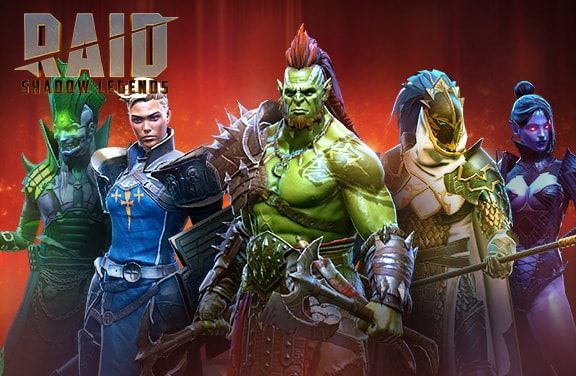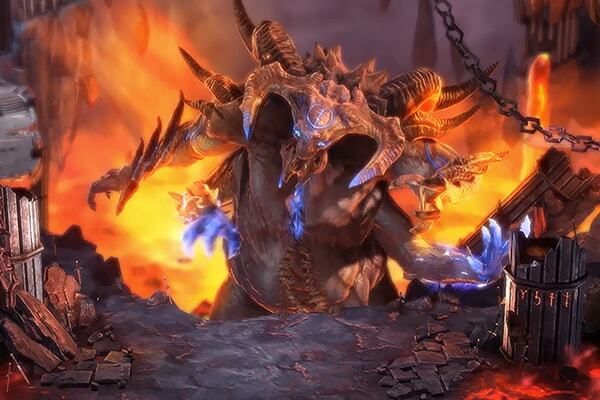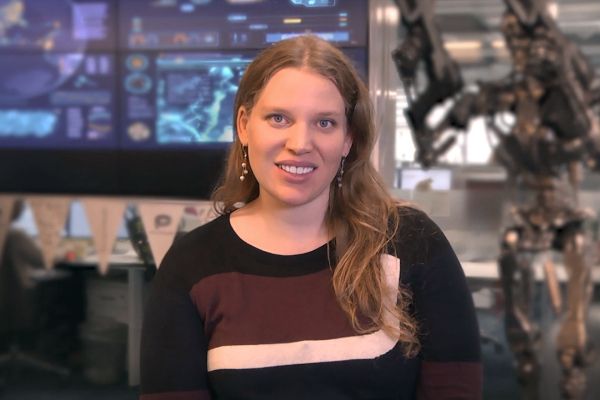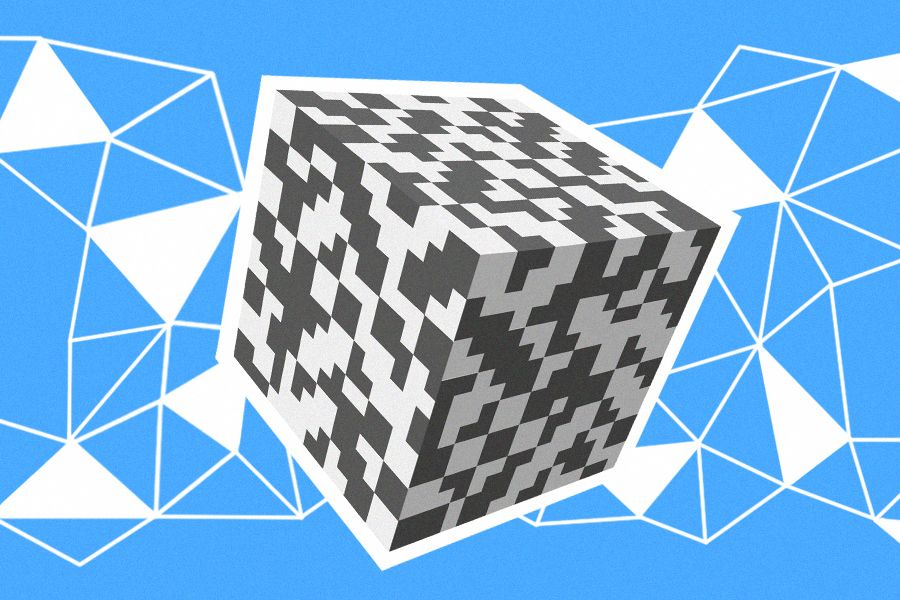Plarium’s Vyshyvanka: How to Communicate a Company’s Story Through Merch
This text is a translation of an article originally published on Сases Media.
Every year, our Ukrainian employees celebrate Vyshyvanka Day. Employees come to the studio and to online meetings in festive clothes, and everyone posts photos of their outfits on the company's internal employee portal.
Last year we released a collection of three t-shirts featuring stylized tridents, and this year we took on a more difficult task – creating our own vyshyvanka for Ukrainian Independence Day.
We always try to make merch that employees would be happy to wear on weekdays and holidays, to the office and on outings with friends. The goal is to make a stylish garment that makes everyone happy and allows them self-expression, not to just slap a huge logo on something and turn employees into living advertisements for the company.
We knew that we wanted to make a special outfit – an embroidered shirt, each element of which resonates with employees because it conveys the story of the company and the projects we create together every day.
How we wove the story of the company and its projects into merch
The vyshyvanka is a symbol of Ukrainian identity and cultural heritage. First of all, we did some research. Before sketching the patterns, our Branding Design Team Lead Yan Yushyn perused many ancient and modern vyshyvankas, studied the book "The Code of the Ukrainian Embroidery" by Maria Chumarna, and even researched the history of the Ukrainian trident.
Each embroidered shirt of the past tells its own story: about the customs of the region, a person's activities and their values, and more. We decided to continue this tradition with Plarium’s vyshyvanka and tell the story of our game studios from Ukraine. We took symbols from our games, inspired by Ukrainian culture, and also stylized elements of our flagship titles RAID: Shadow Legends and Mech Arena, which were developed by the Ukrainian team, as tridents.
This vyshyvanka is about Plarium and our common present – so let's take a closer look at the symbolism of each element.

Tridents
During our search for basic elements for the visual identity of the vyshyvanka, one of the first things that came to our mind was, of course, the trident.
The trident is an ancient Ukrainian symbol, the first written mention of which was recorded in the 10th century. It was the family sign of the Rurikid dynasty and was transferred by succession. During the time of Kyivan Rus, almost every prince changed their coat of arms to suit their own preferences, so Ukrainian heraldry has approximately 200 variations of the trident image.
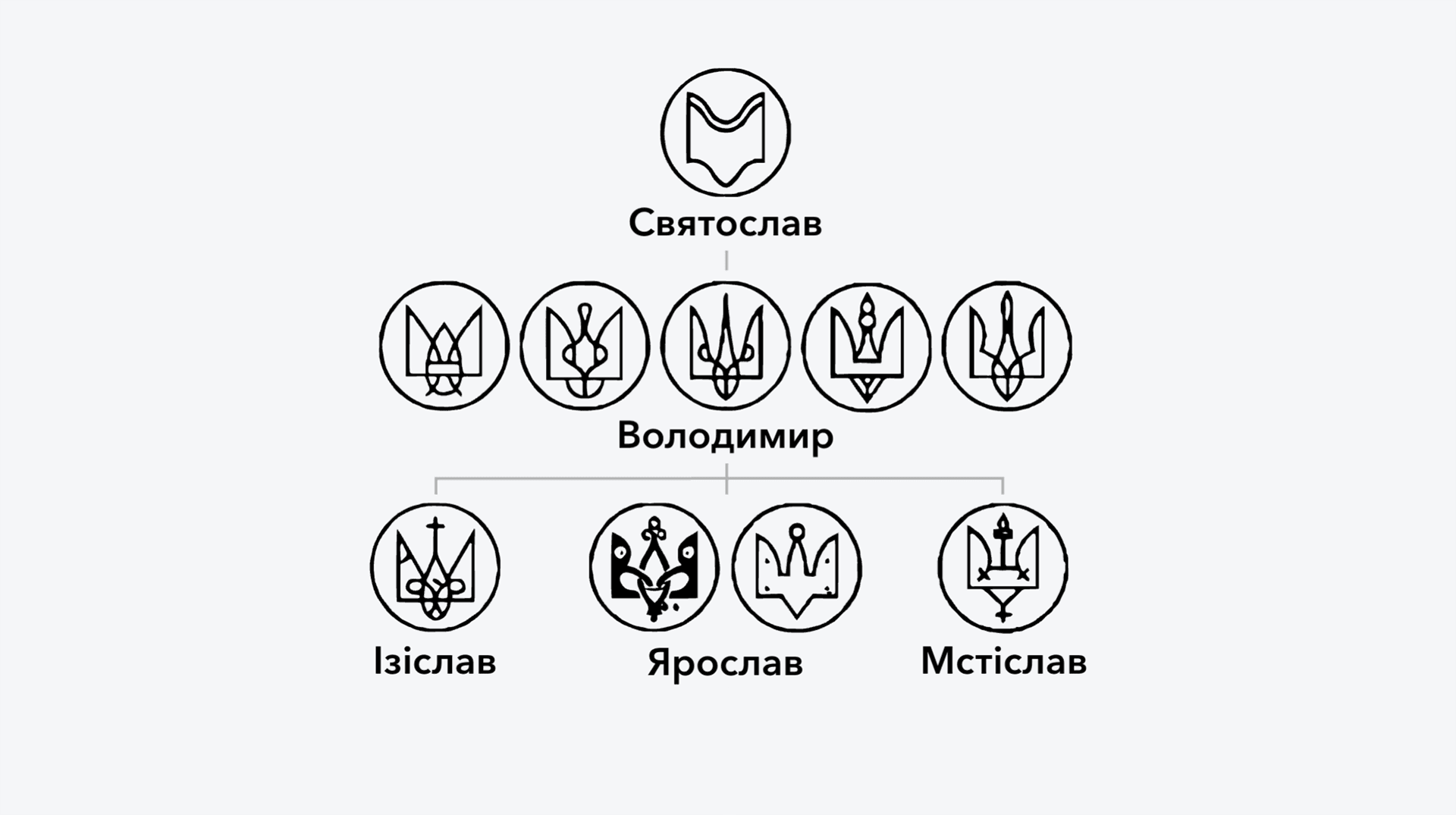
Variations of depicting tridents in the Rurikid dynasty
As such, we wanted to find elements in our games that could be stylized as tridents.
Tridents: Killshot and Surge Mechs from Mech Arena
Traditionally, vyshyvankas served as a protective talisman, so we added two guardian angels from the action shooter Mech Arena. Out of 30 Mechs, we chose Killshot and Surge – both speedy and capable of fast attack.
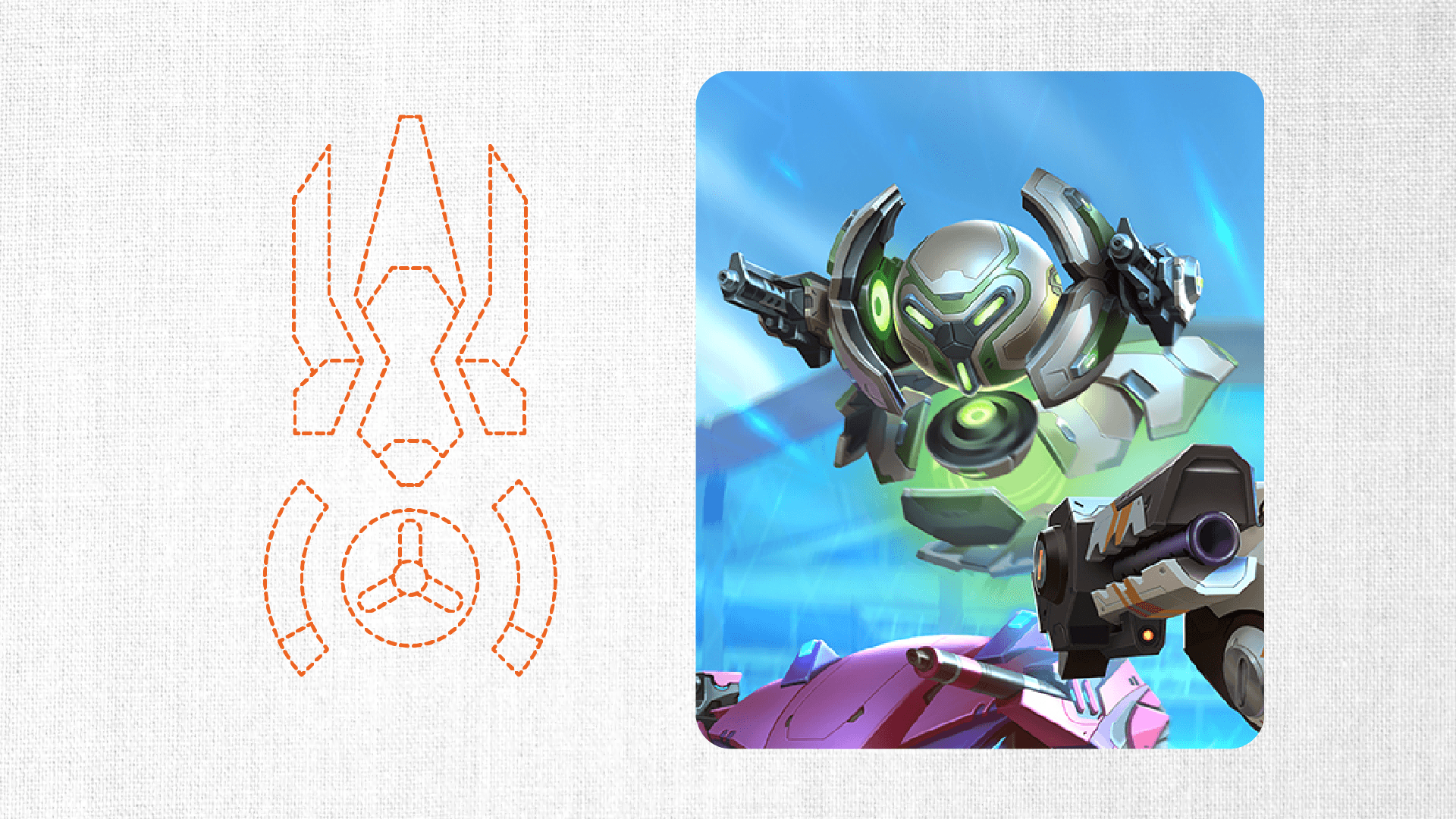
Tridents: Dragon from RAID: Shadow Legends
The dragon-wyrm in folklore embodies the powerful force of nature – but it can be cowed into submission and made to serve man. According to legend, heroic bohatyrs harnessed a wyrm to a giant plow and plowed furrows that were hundreds of kilometers long. This is how the Serpent’s Wall, which protected ancient Kyiv, appeared.
The giant dragon Hellrazor from RAID: Shadow Legends was transformed into a trident himself, becoming the largest on the vyshyvanka.
Tridents: “Rocks”
One of the pillars of Plarium is an internal employee portal known as “Rocks". To drop a “Rocks” on a news post on the portal is an almost daily action for most employees – so we decided to embroider the “Rocks” symbol onto the vyshyvanka as well.
The Bandurka
Last year, we developed two Ukrainian characters for RAID: Shadow Legends – Taras the Fierce and Marichka the Unbreakable. They became not only characters in the game, but also symbols of care and support for everyone who continues to help Ukraine in its fight. We did not forget them here either.
In the game, Taras the Fierce performs the anthem of the Sich Riflemen “Oi u luzi chervona kalyna” (“Oh, the red viburnum in the meadow”) on the bandurka, an ancient folk instrument. We embroidered his bandurka onto the vyshyvanka as well.
Nightingales, Roses, Ears of Wheat
Marichka the Unbreakable inspired the creation of three elements:
- Nightingales – a significant symbol of Ukrainian culture – from the character’s shoulder pads are also located on the shoulders of the embroidered shirt.
- The roses that are part of a metal wreath on her helmet embody the folk idea of harmony and the universe.
- An ear of wheat from a wreath made from numerous grains – which give life – is a symbol of wealth and fertility.
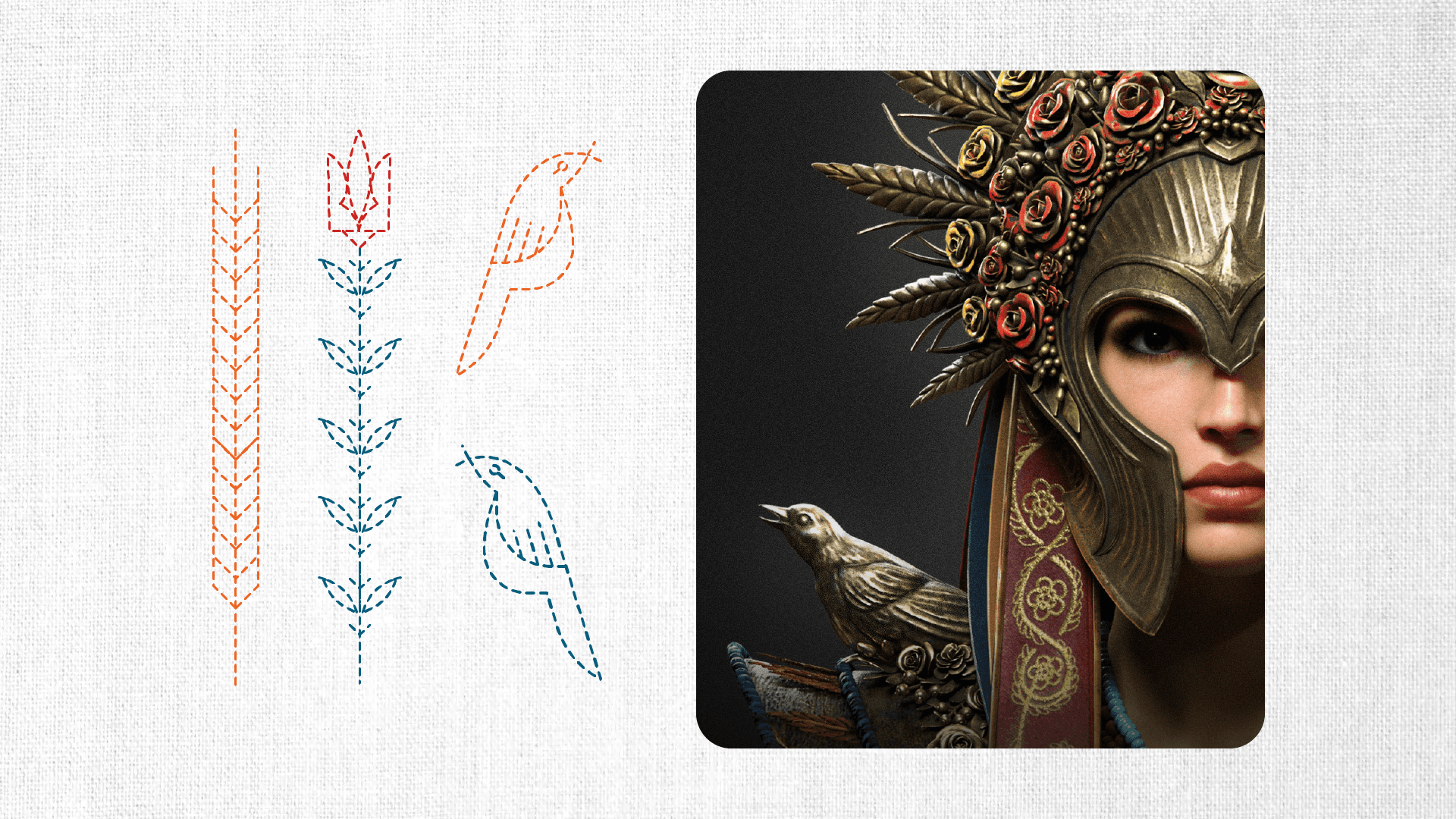
Rhombuses with Ram Horns
This is a traditional Ukrainian embroidery pattern. An attentive viewer will realize that this same pattern was used on the costume of Stefania Shevchenko, the Ukrainian pilot from Mech Arena, as well as on the armor of Taras the Fierce.
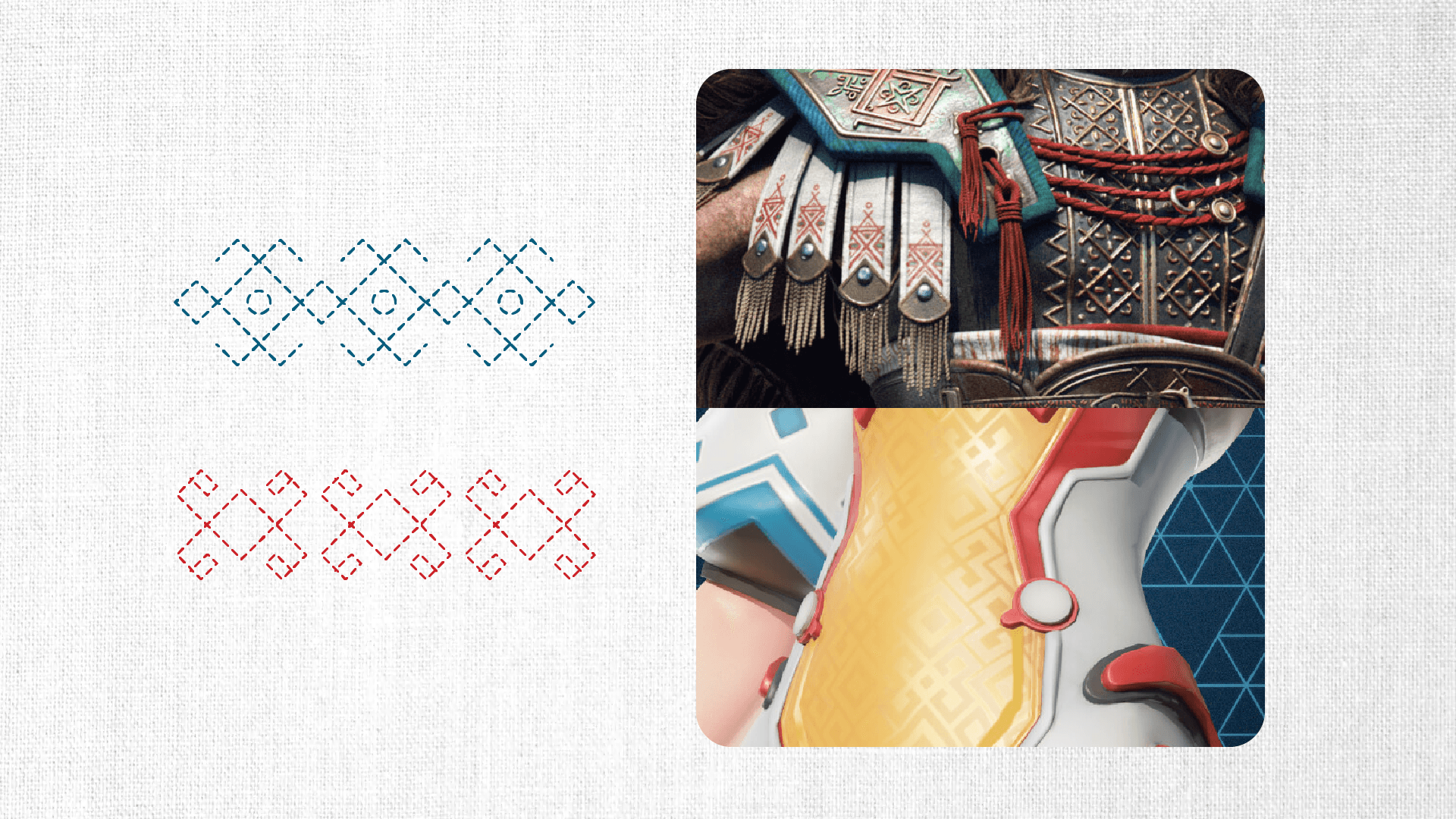
Triangular Flowers
They can be seen in the wreath of the Mech Arena pilot Stefania. These flowers also resemble Fortune Vaults from the game, which contain useful resources for pilots. In traditional Ukrainian embroidery, the triangle is a symbol of the unity of three worlds: the earthly, the underworld, and the heavenly.
The Tree of Life
The Portal and Shards in the game RAID: Shadow Legends are used to summon new characters. The aforementioned elements on the vyshyvanka form the tree of life. This is an important motif in Ukrainian embroidery which depicts the connection between generations and worlds – the heavenly and ours. Flower-like Shards are located on a stem of golden-yellow light, which the Portal emits during the summoning of characters using Shards. The tree is crowned with the symbol of the Arbiter – an Easter egg from the animated limited series RAID: Call of the Arbiter.
The Plarium Logo
We always pay special attention to logo placings on merch. For us, merch is not a brand advertising tool – it’s a way to encourage employees and make them happier. Therefore, it is important for us that a logo placement looks natural and doesn’t catch the eye too much.
In this case of this shirt, we felt that a noticeable embroidered logo would negate the whole creative idea. As such, we decided to place the logo on a small textile tag in the side seam of the vyshyvanka, and next to it we added a small blue and yellow flag.
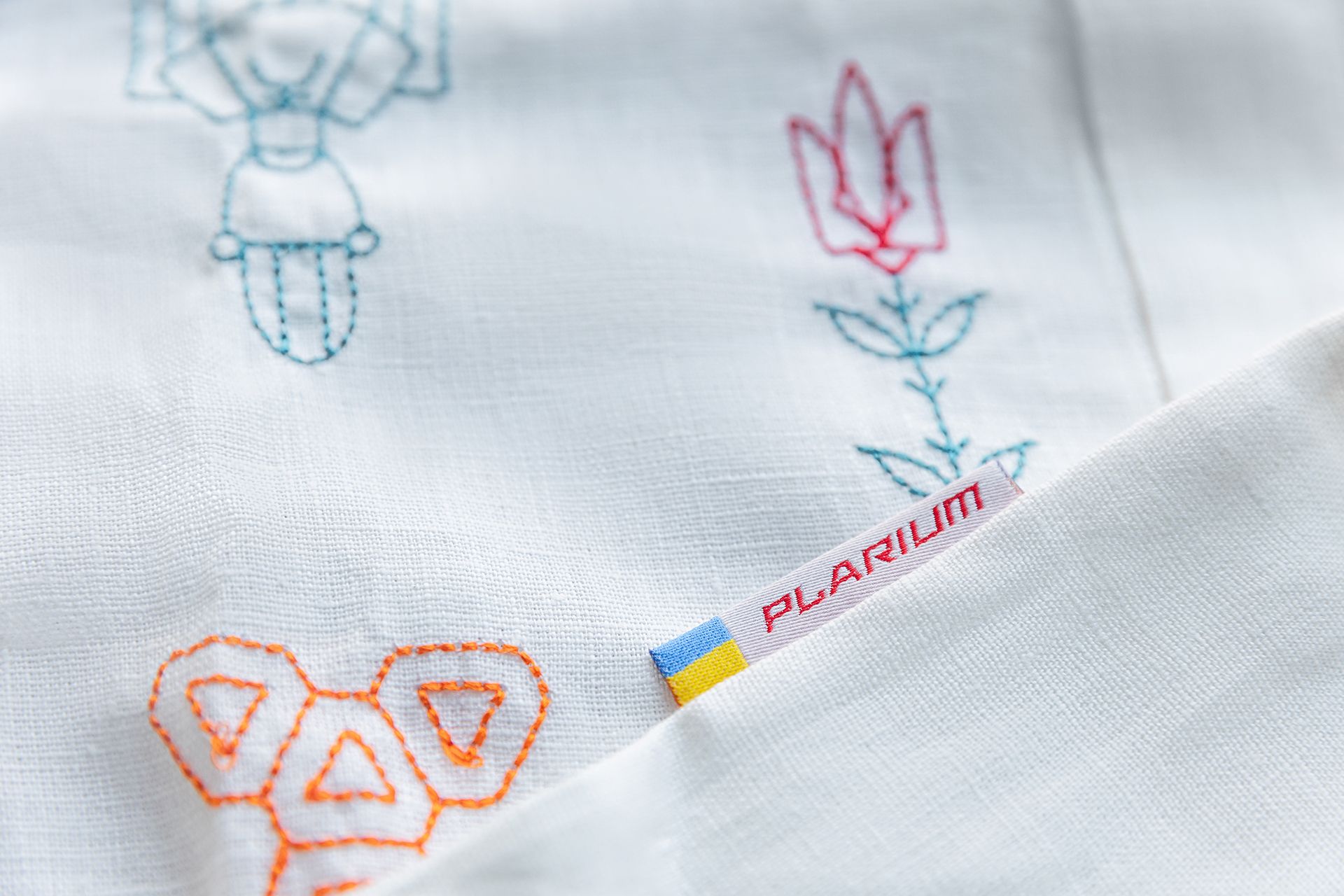
Attention to detail
The fabric and quality of the product affect the perception of merch as much as the design, so during development we had to consider everything down to the smallest detail.
We decided to go for an oversized style that would fit both women and men equally well. To create the vyshyvankas, we purchased 2790 meters of linen and 597 000 meters of embroidery thread. Of course, it was also important for us to choose a Ukrainian contractor for the production of this merch.
(Not so) little things that we took into account to get a quality result
- Made a separate machine embroidery scheme for each shirt size. This was so that the proportions and placement of the embroidered elements looked identical on all shirts from the XXS to the XL sizes.
- Thought about how the merch would wear. Linen clothes tend to shrink slightly after washing. We wanted to make sure that the vyshyvanka would remain oversized, which is why we looked for the pre-washed fabric.
- Made test samples. This meant we’d be able to visually make sure that the result 100% met our expectations and also make adjustments if necessary.
- Special attention was paid to children's merch. We adapt a large proportion of our merch into a children's version. For this shirt, we chose a different linen – with cotton admixtures – to make the fabric softer and more comfortable to the touch.
- Recycled packaging was made. We wanted to make the packaging eco-friendly so we sewed the bags from denser linen and developed a visual identity for them. The bag can be reused for shopping or storing things.
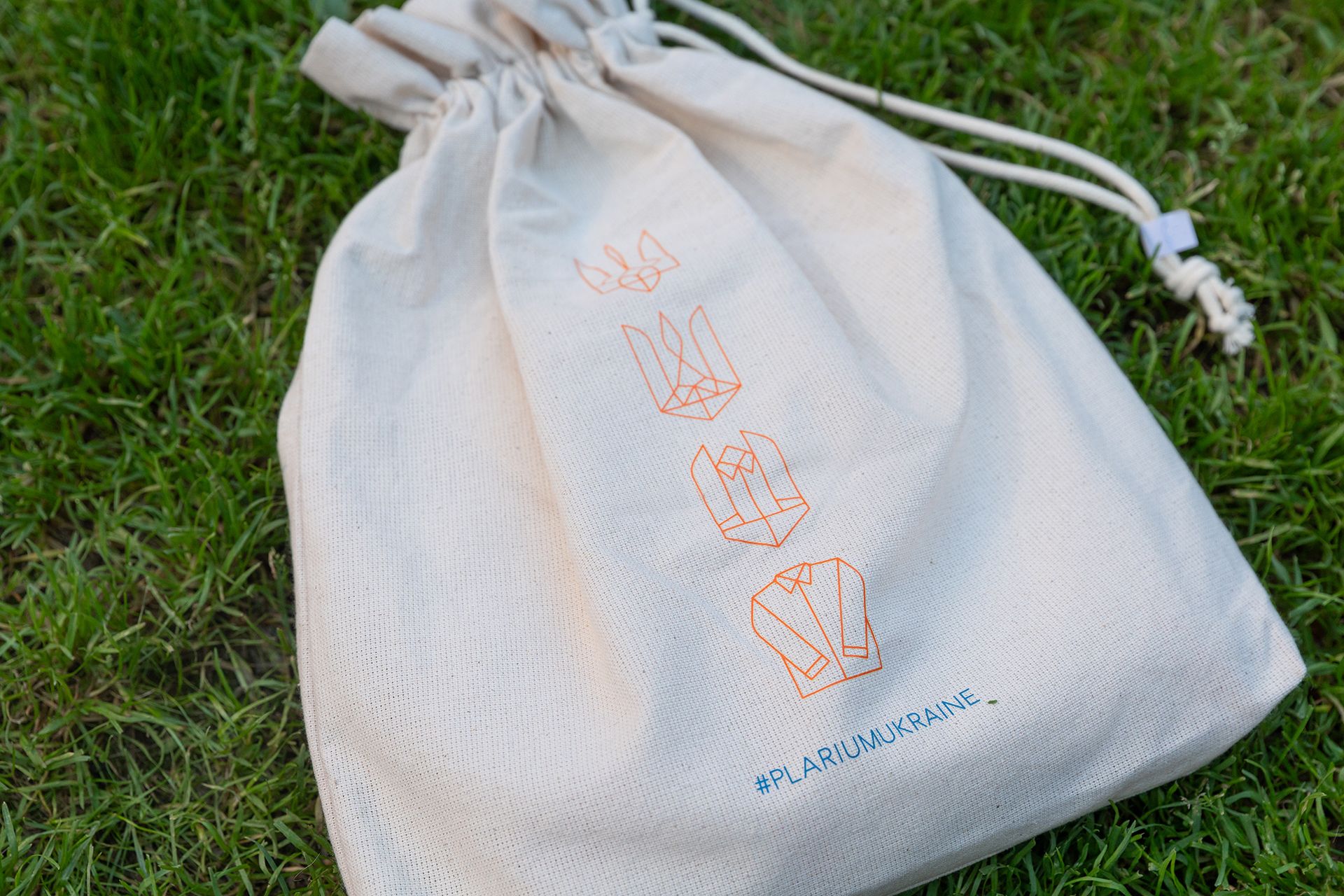
Five tips for creating merch
-
Begin work by studying employees’ requests. Draw from people's needs. You're creating merch for them, not for the company.
-
Base the visual identity on brand attributes: projects, history, etc. Just a simple logo on merch will look boring. People want to look stylish, to attract the attention of others with their outfit, and to not be a living advertisement with a huge logo on them.
-
Think down to the smallest detail of how the merch will be used. Make test samples. Adapt visual identity schemes to different sizes. Pay attention to how and when the merch will be worn, and how it will look after washing.
-
Approach packaging design as a separate component of merch. People form the very first impression of merch during unpacking. Create a wow effect at this stage first. Make the packaging practical and environmentally friendly, so that your box or bag with a logo can be reused for other purposes.
-
Analyze employees’ reactions to merch. We begin and end the process with people's needs. Only by taking into account employees’ reactions can you understand whether you’ve achieved your goal or whether you did everything as well as possible.
On our internal company portal, employees usually leave their first impressions about this or that event, news item, etc. We received a lot of enthusiastic feedback on the the post about the vyshyvanka:

“Very interesting ideas behind every vyshyvanka element, as always every detail is thought out and very beautiful. Thank you for such stylish and wonderful items of clothing!”

“Thanks! The vyshyvanka is top-notch merch! Yesterday, walking around Lviv, several people approached me and asked where I got such an awesome vyshyvanka!”

“Yesterday, my vyshyvanka got a lot of compliments. Everyone looked at it with admiration, wondering where to order one. Thanks, great job!”

“I thought it couldn't get any better than the Raid x MA hoodie. But this one is simply a masterpiece. Thank you for this incredible work!”
In order to give employees the opportunity to share not only their photos but also quality content with details about the vyshyvanka, we shot a video in the Ukrainian Carpathians. This post was shared almost 200 times on Instagram alone:
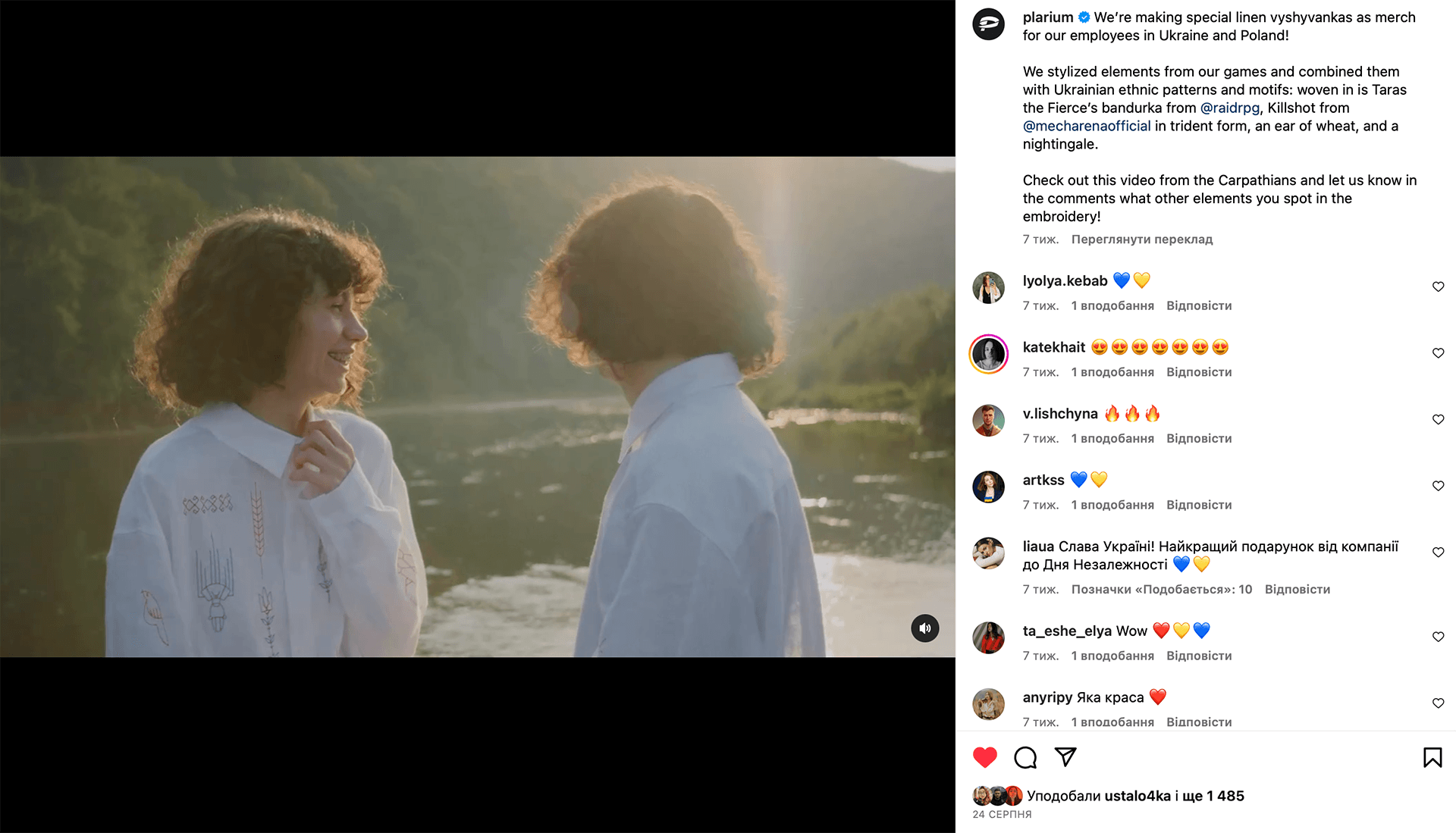
Creating a vyshyvanka that communicates the story of our company is a significant project for Plarium. We hope you found learning about our approach useful.
